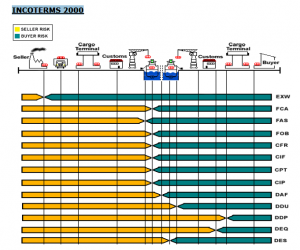Misschien moet je eens verdiepen in de zgn incoterms: http://www.iccwbo.org/incoterms/id3045/index.html
Samenvatting:
EXW - EX WORKS
The seller’s only responsibility is to make the goods available at his premises in a condition
prepared for export. The seller is not responsible for loading the goods in the vehicle
provided by the buyer, unless otherwise agreed. The buyer bears the full cost and risk
involved in bringing the goods from there to the desired destination.
FAS - FREE ALONGSIDE SHIP
The seller’s obligations are fulfilled when the goods have been placed alongside the ship on
the quay (wharf). The buyer bears all costs and risks of loss or damage to the goods from
that moment. Unlike FOB, FAS requires the buyer to clear the goods for export.
FOB - FREE ON BOARD VESSEL
The goods are placed on board a ship by the seller at a port of shipment named in the sales
contract. The risk of loss or damage to the goods is transferred from the seller to the buyer
when the goods pass the ship’s rail during loading. This term only applies to transportation
by sea or inland waterway only.
CFR - COST AND FREIGHT
The seller must pay the costs freight necessary to bring the goods to the named destination,
but the risk of loss or damage, as well as any cost increases, is transferred from the seller to
the buyer when the goods pass the ship’s rail in the port of shipment. Applicable for sea or
inland waterway transport only.
CIF - COST, INSURANCE AND FREIGHT
This term has the same meaning as CFR, but with the addition that the seller has to procure
marine insurance against the risk of loss or damage to the goods during carriage. The seller
pays the insurance premium.
DES - DELIVERED EX SHIP
The seller makes the goods available to the buyer on board the ship at the destination
named in the sales contract. The seller bears the full cost and risk involved in bringing the
goods there.
DEQ - DELIVERED EX QUAY (DUTY PAID)
This term means that the seller must deliver the goods to the buyer on the quay (wharf) at
the named port of destination, cleared for importation. The seller has to bear all risks and
costs including duties, taxes and other charges for delivering the goods. This term should
not be used if the seller is unable to obtain the import license. If the buyer is the party who
will clear the goods for importation and pay the duty, then the term is changed to "DUTY
UNPAID". This term applies to sea or inland waterway transport.
DDU - DELIVERED DUTY UNPAID
DDU means that the seller makes the goods available to the buyer at the named place (e.g.
door) in the country of importation. The seller has to pay the costs and bear the risks
involved in bringing the goods to that point as well as the costs and risks of carrying out
customs formalities. However, the buyer must obtain the import license and pay the actual
duties, taxes and official charges payable upon importation. This term may be used
irrespective of the mode of transport.
DDP - DELIVERED DUTY PAID
While the term "EX-WORKS" signifies the seller’s minimum obligation, DDP, when followed
by the buyer’s location in the destination country, denotes the seller’s maximum obligation.
The seller provides the import license and is responsible for delivery, import duties, taxes,
other import-related charges. This term may be used irrespective of the mode of transport.
FCA - FREE CARRIER
This term has been designed to meet the requirements of modern transport, particularly
such "multimodal" transport as container or "Roll on / Roll off" traffic by trailers and ferries
as well as carriage by air. FCA is based on the same principle as FOB except that the seller
fulfils his or her obligation when goods are delivered into the custody of the carrier at the
named point. If no precise point can be mentioned at the time of the contract of sale, the
parties should refer to the place or range where the carrier should take goods into his
charge. The risk of the loss or damage to the goods is transferred from the seller to the
buyer at that time and not at the ship’s rail. "Carrier" means a person by whom or in whose
name a contract of carriage by road, rail, air, sea or a combination of modes has been
made.
CPT - CARRIAGE PAID TO
Like CFR, CPT means that the seller pays the freight for the carriage of the goods to the
named destination. However, the risk of loss or damage to the goods, as well as any cost
increases, it transferred from the seller to the buyer when the goods have been delivered
into the custody of the first carrier and not at the ship’s rail. It can be used for all modes of
transportation.
CIP - CARRIAGE AND INSURANCE PAID TO
This term is the same as "Carriage Paid to-" but with the addition that the seller has to
procure transport insurance against the risk of loss or damage to the goods during the
carriage. The seller pays the insurance premium.
DAF - DELIVERED AT FRONTIER
DAF means that the seller’s obligations are fulfilled when the goods have arrived at the
frontier, but before the "customs border" of the country named in the sales contract. The
term may be used for any frontier including that of the country of export. Therefore, it is
important that the frontier be defined precisely by naming the point and place in the term.
The term is primarily intended to be used when goods are to be carried by rail or over the
road, but it may be used irrespective of the mode of transport.

